
|
BMS Alumnus receives Heinz Maier Leibnitz Prize 2019
Now a junior professor at the HU Berlin and DFG Heisenberg Researcher at the Max Planck Institute for Mathematics in the Sciences (MPI MiS) in Leipzig, Nicolas was honored with this, the most important award for young scientists in Germany, in recognition of his scientific achievements in the field of probability theory. His research focuses on singular stochastic partial differential equations, applied stochastic analysis and robust financial mathematics. Established in honor of the German physicist Heinz Maier-Leibnitz, this prize was deemed one of the top three major scientific awards in Germany by the major research institutions. It is given not only in recognition of excellent research, but also as an incentive to continue with the pursuit of an academic career. The prize is funded by the German Ministry of Education and Research (Bundesministerium für Bildung und Forschung/BMBF) and is awarded by a selection committee appointed by the DFG and the BMBF. Congratulations Nicolas!
Source: DFG 2019 Cantor Medal for Hélène Esnault
The DMV Presidium selected Esnault for her outstanding scientific achievements in mathematics. The members of the committee described her as one of the world's most prominent personalities in mathematics today, and commended her for her profoundly impressive results in algebraic geometry and their impact on other scientific areas. Esnault was born in Paris and has dual French-German citizenship. She got her PhD in 1976 from the University of Paris VII and did her habilitation at the University of Bonn in 1985. After holding positions at Paris VII, MPI Bonn and the University of Duisburg-Essen, Esnault joined the FU Berlin in 2012 as its first Einstein Professor, where she is head of the algebra and number theory research group. Her awards and honors include the Paul Doisteau-Emile Blutet Prize (2001), the Gottfried Wilhelm Leibniz Prize jointly with Eckart Viehweg (2003), two honorary doctorates, and full membership of four science academies. Esnault was also an invited speaker at the 2002 ICM in Beijing and the 2012 ECM in Krakow. The Cantor Medal is the most important scientific prize awarded by the DMV and candidates must be associated with the German-speaking area. The medal will be presented to Esnault at an official ceremony during the DMV Annual Meeting in September 2019 and comes with prize money in the sum of 4000 euros. Congratulations Hélène! Written by S. E. Sutherland-Figini Source: DMV New Horizons In Mathematics Prize for Karim AdiprasitoKarim Adiprasito, BMS and FU Berlin alumnus, is one of five recipients of the 2019 New Horizons In Mathematics prizes. Karim was selected together with June Huh for their joint work with Eric Katz on the development of "combinatorial Hodge theory leading to the resolution of the log-concavity conjecture of Rota". Karim did his PhD at the FU Berlin under the supervision of Prof. Günter M. Ziegler, and graduated with summa cum laude in May 2013. In 2014, this highly talented young academic received the Ernst Reuter Prize for his outstanding PhD dissertation, and in 2015 he was one of three young researchers to be honored with the European Prize in Combinatorics. After starting a postdoc position at Hebrew University of Jerusalem in 2014, Karim became an associate professor there in 2016. He now combines that with his most recent appointment as professor of mathematics at the University of Leipzig, which he took up on a half-yearly basis in 2017. The New Horizons in Mathematics Prize is part of the annual Breakthrough Prize series established and funded by Anne Wojcicki, Yuri Milner, Mark Zuckerberg and others. Three New Horizons prizes were awarded to five mathematicians for their early career achievements in their respective fields. Adiprasito and Huh will be awarded their prize at the 2019 Breakthrough Prize ceremony on 4 November 2018 in California. The ceremony will be hosted by actor, producer and philanthropist Pierce Brosnan and broadcast live on National Geographic. The former BMS Dirichlet Postdoctoral Fellow, Maryna Viazovska, who solved the sphere packing problem in dimension 8, was a winner of the New Horizons In Mathematics prize in 2018. This prize comes with a monetary award in the sum of US $100,000. Congratulations Karim and June! Written by S. E. Sutherland-Figini Source: Breakthrough Prize BMS students attend the 6th HLFThe 6th Heidelberg Laureate Forum (HLF) took place at Heidelberg University from 23 to 28 September 2018. The HLF is a networking event for mathematicians and computer scientists from all over the world and is organised annually by the Heidelberg Laureate Forum Foundation (HLFF). 200 young scientists from 60 nations were successful in convincing the foundation's scientific advisory board of their outstanding academic abilities to secure a place at this event, where they were given the chance to interact extensively with 32 Laureates of mathematics and computer science. The Laureates are the winners of some of the most prestigious awards in those two fields: the Abel Prize, the Fields Medal, the Nevanlinna Prize and the ACM A.M. Turing Award. There are several stages in the career of a young researcher during which they may apply to attend the HLF: undergraduate; graduate (in the PhD phase); or postdoc. Four BMS students were selected to attend the HLF this year: The 7th HLF will take place in September 2019 and the application process will begin on 15 November 2018. The HLF was initiated by the Klaus Tschira Stiftung (KTS), a German foundation which promotes natural sciences, mathematics and computer science, and the Heidelberg Institute for Theoretical Studies (HITS). The Forum is organized by the HLFF along with KTS and HITS. It is strongly supported by the award-granting institutions: the Association for Computing Machinery (ACM: ACM A.M. Turing Award), the International Mathematical Union (IMU: Fields Medal, Nevanlinna Prize), and the Norwegian Academy of Science and Letters (DNVA: Abel Prize). A longer news article in English can be found on the HLF website. Written by S. E. Sutherland-Figini BMS at AIMS in Ghana
After the seminar series had ended, Martha scheduled a meeting with the AIMS students a few days later in order to give a one-hour presentation about the BMS. She first described the structure of Phase I and Phase II, then talked about the math landscape in Berlin, and followed that with information about the BMS study program, including soft-skills seminars, What is...? seminars and BMS Friday lectures. She emphasized how important the latter two events are for coming into contact with other fields of mathematics and the people active in them. Martha then added a personal touch by telling the students about her life as part of the BMS family, the various social activities organized by the student representatives, as well as the BMS Buddy Program, which for Martha has been a great success as her buddy is still happy to offer help whenever she needs it. She also told the AIMS students about three members of their alumni who found their current success by doing a PhD in stochastics via the BMS. They are Victor Fenou Nzengang, BMS Alumnus and now a postdoc at the University of Freiburg; Klébert Kentia Tonleu, BMS Alumnus and now a senior consultant in Frankfurt; and Ludovic Tangpi, a former BMS Phase II student, who is now an assistant professor at Princeton University. She also took the opportunity to mention that one can experience the BMS by applying to a BMS Summer School too, which a friend of hers from AIMS South Africa did. Her application was successful and she came to Berlin for the 2017 BMS Summer School in "Probabilistic and Statistical Methods for Networks". Martha's presentation included a long and lively discussion, and at the end she handed out informational material and promotional items from the BMS.
Dirk and Martha's activities at AIMS Ghana were made possible through the "Berlin-AIMS Network in Stochastic Analysis", whose goal it is to foster scientific exchange between mathematicians in Berlin and Ghana. The collaborating partners are the HU Berlin, WIAS and AIMS Ghana and this network is part of a DAAD-funded program that supports university cooperation with AIMS (Hochschulkooperationen mit dem AIMS). In coordination with Dr. Pamen, Dirk and Martha will soon welcome some ambitious students from the AIMS research center to Berlin for a reciprocal visit. Naturally, these young researchers are very much looking forward to experiencing the wide mathematics environment in Berlin and, in particular, are keen to learn more about the activities of the BMS community during their stay. The BMS would like to thank Dirk and Martha for their efforts on behalf of the BMS, and thank you to Dr. Pamen for the hospitality he gave them! AIMS was founded in South Africa in 2003 as a pan-African center providing advanced, broadly applicable mathematical skills to talented students recruited from all over the continent. Since 2011, AIMS has opened additional centers in Senegal, Ghana, Cameroon, Rwanda and Tanzania. Written by S. E. Sutherland-Figini Success for the BMS in the Excellence Strategy!
On the basis of previous international review sessions, members of an international committee of experts appointed by the Joint Science Conference (GWK) deliberated on a total of 88 proposals on 25 and 26 September. The final selection was made in the Excellence Commission, where members of the committee of experts convened with federal and state government ministers responsible for science and research. From the 88 proposals, 57 were successful nationwide, and the Berlin Mathematics Research Centre “MATH+“ was one of seven proposals from Berlin selected to be funded by the DFG as a Cluster of Excellence for the next seven years. From 1 January 2019, MATH+ will be established as a new joint cluster of the three Berlin universities, Freie Universität Berlin, Humboldt-Universität zu Berlin and Technische Universität Berlin, as well as Weierstrass Institute for Applied Analysis and Stochastics (WIAS) and the Zuse Institute Berlin (ZIB). The Berlin Mathematical School will be part of MATH+ and will continue as a graduate school for mathematics within this new framework. This success will give the BMS the opportunity to extend its current activities, for example to continue supporting the BMS Dirichlet Postdoctoral Fellowship. Congratulations to all members of the BMS and to all those actively involved in planning and composing the MATH+ proposal! Written by S. E. Sutherland-Figini BMS Certificate Ceremony 2018On Friday 13 July 2018, the BMS Certificate Ceremony took place in the Goethe Saal at Harnack-Haus in Berlin's leafy residential district of Dahlem. After the final BMS Friday Colloquium of the summer semester given by Prof. Dr. Monique Laurent (CWI, Amsterdam), BMS students, friends, family and BMS faculty, staff and guests joined together to celebrate the academic achievements of 21 BMS Phase I graduates and 83 BMS Phase II graduates. The certificate ceremony began with a welcome speech by the new BMS Chair, Prof. John M. Sullivan, who began by congratulating the recent graduates on their success. He then reported that, in the 12 years since its foundation, the BMS has celebrated the success of 300 PhD graduates, and remarked that the internationality of BMS students continues to have a great effect on the math landscape in Berlin. In his short speech, Prof. Günter M. Ziegler, the outgoing BMS Chair and new President of FU Berlin, highlighted the internationality of the BMS management too and, in a quote by Hemingway, he encouraged the new graduates to be prepared for whatever luck the future might bring. Monique Laurent returned to the stage to award Certificates of Completion to those students who completed Phase I during the past two years by passing the BMS Qualifying Exam. She then awarded Certificates of Distinction to the Phase II students who completed their PhDs in the same period. The ceremony also included musical performances by the duo "Wild Strings", a violinist and guitarist who perform their own improvised versions of classical music pieces. After receiving their certificates, the BMS graduates gathered in the garden for some photographs and then everyone joined them outside to enjoy the celebratory reception under the warm evening sun.
Patrick Morris, a Phase I graduate from the UK who is now halfway through Phase II, was grateful to the BMS for organizing such a special celebration and giving graduates the opportunity to invite friends and family along. Through the presentation of Phase II dissertation titles, he said his guests were able to get a real impression of where all his hard work can lead to. Antje Bjelde, a BMS Phase II graduate from Germany who is now working as a freelance researcher, said that seeing a "Dr." title before her name, as it was displayed on the presentation, is still a surreal feeling. Phase I graduates Dragana Radojičić from Serbia and Shimaa Elesaely from Egypt both travelled back to Berlin from abroad to attend the ceremony. Dragana said: "It was a great pleasure to attend the ceremony and I was very happy when I got an invitation. I finished Phase I of the BMS program two years ago, and since then I do not miss an opportunity to visit Berlin and meet friends I made here. In addition to meeting dear people from the BMS, these events are always nicely organized with a wonderful atmosphere and great food." Shimaa remarked: "What I liked was to see old friends again and to celebrate my success with them. During the ceremony I enjoyed the music, and afterwards I enjoyed the delicious buffet and socializing with friends, professors, students and staff." Almost 150 people attended on the day and we would like to thank everyone who joined us in celebrating the academic success of our students. Not all of our graduates were able to attend the ceremony, so we would like to take this opportunity to congratulate everyone. Well done, we are very proud of you all!
John M. Sullivan new Chair of the BMS
Sullivan took up his post on 1 July 2018 in accordance with the rotating chairmanship, and succeeds Günter M. Ziegler of Freie Universität Berlin (FU). An assembly of BMS faculty members unanimously elected Sullivan as the new chair and paid tribute to his predecessor, who was recently elected president of the FU Berlin. BMS faculty members then elected Holger Reich, professor of mathematics at the FU, as the new BMS deputy chair to represent Freie Universität Berlin. He will carry out his duties alongside Jürg Kramer, the BMS deputy chair from Humboldt-Universität zu Berlin (HU). The rotational change of the BMS chairmanship occurs every two years between the three participating universities. Sullivan studied at Harvard and Cambridge, before completing his PhD at Princeton in 1990. After holding positions at the University of Minnesota, the University of Illinois Urbana-Champaign and at MSRI in California, he took up his current position at the TU in 2003. His research interests include discrete differential geometry and mathematical visualization. Everyone at the BMS would like to extend sincere thanks to Günter M. Ziegler for his hard work and outstanding commitment as the BMS Chair over the past two years, and we would like to give his successor, John M. Sullivan, a very warm welcome! Written by S. E. Sutherland-Figini Günter M. Ziegler elected President of FU Berlin
In the first ballot of votes cast, Ziegler received 39 of the 61 votes to succeed the long-term president of the FU, Prof. Dr. Peter-André Alt. Required was an absolute majority of 31 votes. Ziegler's main contender was Tanja Brühl, professor of political science at the Goethe University Frankfurt, who received 15 votes. The president of the FU Berlin is appointed by the Berlin Senate and the term of office lasts four years. Ziegler, who is currently the Chair of the Berlin Mathematical School, a professor of mathematics at the FU Berlin, and honorary professor at the TU Berlin, completed his PhD at MIT in 1987 and did his habilitation at the TU Berlin in 1992. From 1995 to 2011, he was professor of mathematics at the TU, before taking up his current position at the FU in 2011. Ziegler has been nationally and internationally recognized for the remarkable breadth of his mathematical knowledge, and for his services to research in the areas of discrete mathematics, geometry and topology. The German Research Foundation awarded Ziegler the Gerhard Hess Prize and the Leibniz Prize in 1994 and in 2001, respectively. He is a member of the board of the Berlin-Brandenburg Academy of Sciences, and a representative for the German National Academy of Sciences Leopoldina. In 2010, he was honored with an Advanced Grant from the European Research Council and in 2012, he was appointed to the first group of Fellows of the American Mathematical Society (AMS). In 2013, the mathematician was granted the Hector Science Award and appointed Fellow of the Hector Foundation. More recently, in 2017, Ziegler was awarded the Berlin Science Prize, and this year he received the Steele Prize for Mathematical Exposition (jointly with Martin Aigner) from the AMS. Ziegler, who has been acknowledged as an impressive communicator and praised for his reputation as a role model for scholars, young scientists and students alike, succeeds Prof. Dr. Alt, who was elected as President of the German Rectors' Conference (Hochschulrektorenkonferenz) on 24 April 2018, after acting as FU President since 2010. Everyone at the BMS would like to extend their hearty congratulations to Günter on his election as the new president of the FU Berlin!
Source: FU Berlin BMS Alumnus awarded Rollo Davidson Prize
This prize has been awarded annually since 1975 to young mathematicians for outstanding achievement in the field of probability theory. The members of the Rollo Davidson Trust at the University of Cambridge selected Nicolas "for his role in the development of the theory of paracontrolled distributions for singular stochastic partial differential equations and for advances in understanding of the Kardar-Parisi-Zhang equation". Previous prizewinners include Wendelin Werner und Alain-Sol Sznitman, who are former and current BMS Scientific Advisory Board members, respectively. Nicolas did his PhD at the HU Berlin under the supervision of Prof. Dr. Peter Imkeller, and graduated with summa cum laude in December 2013. He then became a postdoctoral researcher at the CEREMADE, a research centre within the Université Paris-Dauphine, before starting as a junior professor for stochastic analysis at the HU Berlin in January 2015. At the beginning of April 2018, he took up a Heisenberg researcher position at the Max Planck Institute for Mathematics in the Sciences (MPI MIS) in Leipzig. Congratulations Nicolas!
Written by S. E. Sutherland-Figini Source: University of Cambridge Statistical Laboratory |


















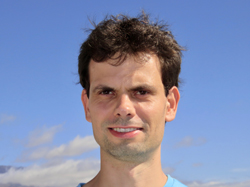 Prof. Dr.
Prof. Dr. 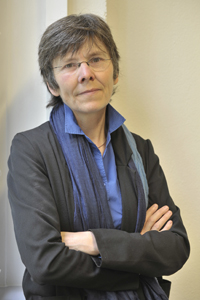
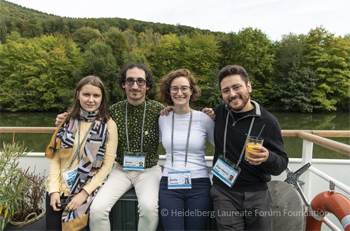 the Phase I student Tatiana Levinson, and three Phase II students Giulia Codenotti, Jorge Alberto Olarte and Josué Tonelli Cueto. The BMS students took the opportunity to converse with their fellow participants and with the Laureates in between attending the various talks, workshops and events.
the Phase I student Tatiana Levinson, and three Phase II students Giulia Codenotti, Jorge Alberto Olarte and Josué Tonelli Cueto. The BMS students took the opportunity to converse with their fellow participants and with the Laureates in between attending the various talks, workshops and events.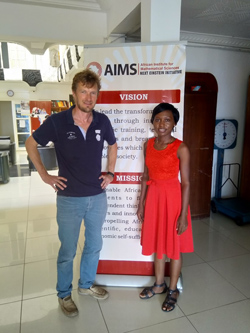 In August 2018, BMS faculty member and HU professor of mathematics,
In August 2018, BMS faculty member and HU professor of mathematics, 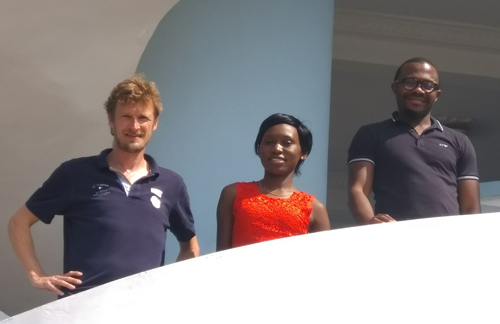 Martha combined her activities for the BMS with a four-week research stay working with Dr.
Martha combined her activities for the BMS with a four-week research stay working with Dr. 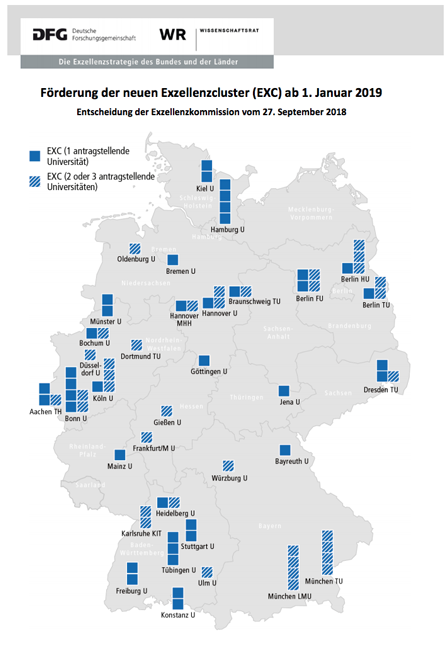 On 27 September 2018, a press conference to announce the decisions about the new Clusters of Excellence to be funded within the framework of the German Research Foundation’s (DFG) Excellence Strategy was live-streamed from the Wissenschaftszentrum Bonn.
On 27 September 2018, a press conference to announce the decisions about the new Clusters of Excellence to be funded within the framework of the German Research Foundation’s (DFG) Excellence Strategy was live-streamed from the Wissenschaftszentrum Bonn.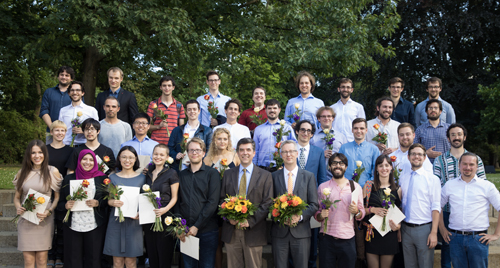
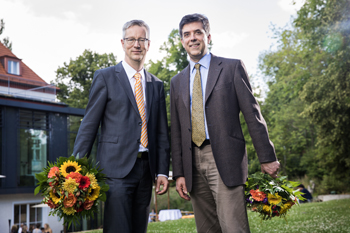
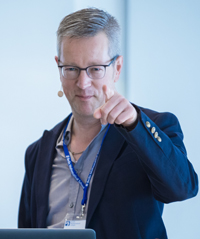 On Wednesday 2 May 2018, the extended Academic Senate (Erweiterter Akademischer Senat) voted in favour of
On Wednesday 2 May 2018, the extended Academic Senate (Erweiterter Akademischer Senat) voted in favour of 

